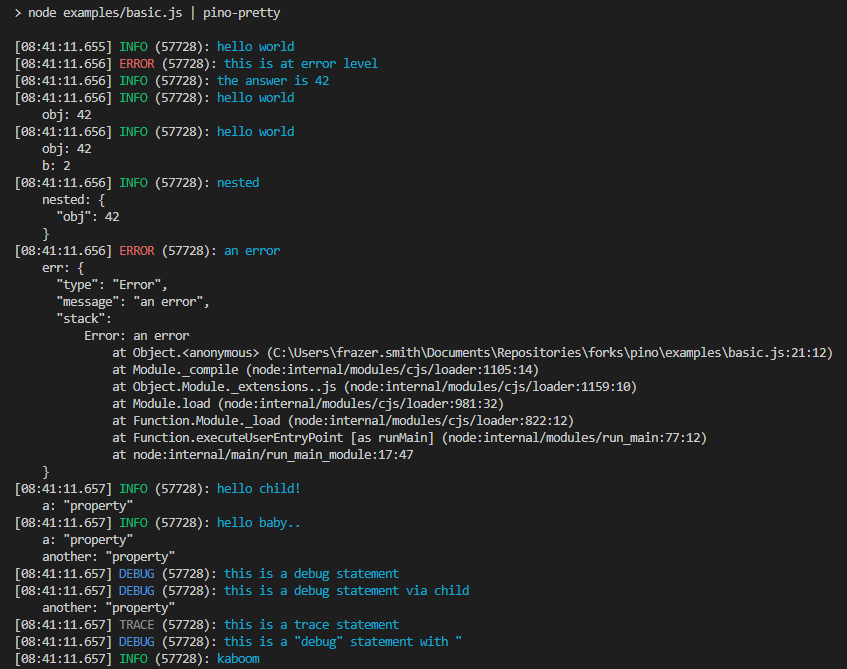
# pino
[](https://www.npmjs.com/package/pino)
[](https://github.com/pinojs/pino/actions)
[](https://standardjs.com/)
[Very low overhead](#low-overhead) Node.js logger.
## Documentation
* [Benchmarks ⇗](/docs/benchmarks.md)
* [API ⇗](/docs/api.md)
* [Browser API ⇗](/docs/browser.md)
* [Redaction ⇗](/docs/redaction.md)
* [Child Loggers ⇗](/docs/child-loggers.md)
* [Transports ⇗](/docs/transports.md)
* [Web Frameworks ⇗](/docs/web.md)
* [Pretty Printing ⇗](/docs/pretty.md)
* [Asynchronous Logging ⇗](/docs/asynchronous.md)
* [Ecosystem ⇗](/docs/ecosystem.md)
* [Help ⇗](/docs/help.md)
* [Long Term Support Policy ⇗](/docs/lts.md)
## Install
Using NPM:
```
$ npm install pino
```
Using YARN:
```
$ yarn add pino
```
If you would like to install pino v6, refer to https://github.com/pinojs/pino/tree/v6.x.
## Usage
```js
const logger = require('pino')()
logger.info('hello world')
const child = logger.child({ a: 'property' })
child.info('hello child!')
```
This produces:
```
{"level":30,"time":1531171074631,"msg":"hello world","pid":657,"hostname":"Davids-MBP-3.fritz.box"}
{"level":30,"time":1531171082399,"msg":"hello child!","pid":657,"hostname":"Davids-MBP-3.fritz.box","a":"property"}
```
For using Pino with a web framework see:
* [Pino with Fastify](docs/web.md#fastify)
* [Pino with Express](docs/web.md#express)
* [Pino with Hapi](docs/web.md#hapi)
* [Pino with Restify](docs/web.md#restify)
* [Pino with Koa](docs/web.md#koa)
* [Pino with Node core `http`](docs/web.md#http)
* [Pino with Nest](docs/web.md#nest)
## Essentials
### Development Formatting
The [`pino-pretty`](https://github.com/pinojs/pino-pretty) module can be used to
format logs during development:

### Transports & Log Processing
Due to Node's single-threaded event-loop, it's highly recommended that sending,
alert triggering, reformatting, and all forms of log processing
are conducted in a separate process or thread.
In Pino terminology, we call all log processors "transports" and recommend that the
transports be run in a worker thread using our `pino.transport` API.
For more details see our [Transports⇗](docs/transports.md) document.
### Low overhead
Using minimum resources for logging is very important. Log messages
tend to get added over time and this can lead to a throttling effect
on applications – such as reduced requests per second.
In many cases, Pino is over 5x faster than alternatives.
See the [Benchmarks](docs/benchmarks.md) document for comparisons.
### Bundling support
Pino supports being bundled using tools like webpack or esbuild.
See [Bundling](docs/bundling.md) document for more information.
## The Team
### Matteo Collina
### David Mark Clements
### James Sumners
### Thomas Watson Steen
## Contributing
Pino is an **OPEN Open Source Project**. This means that:
> Individuals making significant and valuable contributions are given commit-access to the project to contribute as they see fit. This project is more like an open wiki than a standard guarded open source project.
See the [CONTRIBUTING.md](https://github.com/pinojs/pino/blob/master/CONTRIBUTING.md) file for more details.
## Acknowledgments
This project was kindly sponsored by [nearForm](https://nearform.com).
Logo and identity designed by Cosmic Fox Design: https://www.behance.net/cosmicfox.
## License
Licensed under [MIT](./LICENSE).
[elasticsearch]: https://www.elastic.co/products/elasticsearch
[kibana]: https://www.elastic.co/products/kibana